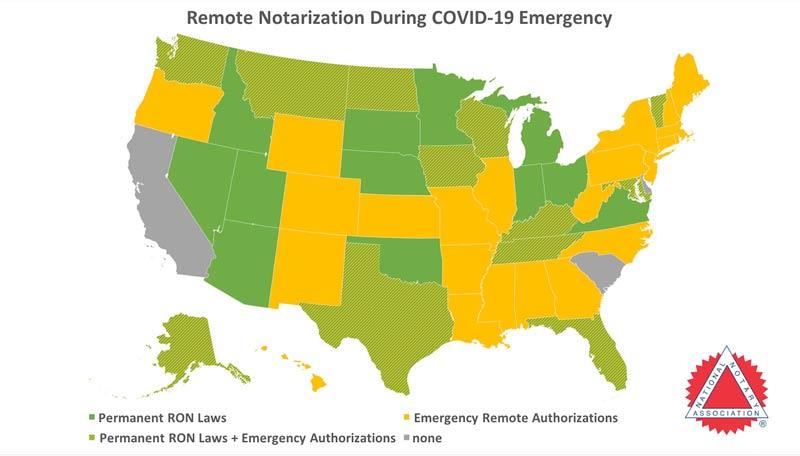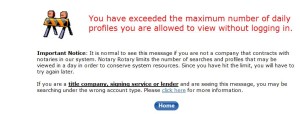
The COVID-19 crisis has caused huge disruptions for businesses as well as individuals. Regardless, important transactions must carry on, including those that require notarization.
Traditionally, notarization has required in-person meetings. Banks and UPS Stores have been a reliable, low-cost option for most people. Nowadays, however, it can be difficult to know their availability and precautions against coronavirus.
Some customers have been trying to find in-person notaries themselves through sites like 123notary.com, Notary Cafe, and Yelp. Even so, it can be difficult to gauge a notary’s experience and skill level, not to mention the safety precautions the notaries might or might not be taking.
A better option might be hiring a nationwide notary agency. Most mobile notaries, like Notary 247 and NSS Notary, are optimized for real estate. That is because every time a house is financed or transferred, a mobile notary must sign off on the transaction. Others might focus on a different niche. For example, N3 Notary specializes in I-9 verifications for remote employees.
Others still work with lawyers on matters related to immigration and corporate law, both requiring a notary to notarize documents online.
Yet some others crave concierge experiences from companies like TheBestNotary.net which provide instant online booking, live status updates, and clear, upfront pricing in a comprehensive e-notary service.
RON Zooms Into the Spotlight with the Rise of COVID-19

Regardless of which option you choose from above, you have to consider the risks involved with in-person meetings in the age of COVID-19. Luckily, more and more states are making exceptions and authorizing the use of remote online notarization (RON). RON also goes by the name of e-notary, electronic signature notary, and mobile notary.
RON is the use of audio-video technology to allow notarization to happen through a video conference instead of the traditional face-to-face meeting.
Jeremy Ofseyer is a graduate of the Harvard Law School (magna cum laude 1990), and certified as a specialist in Estate Planning, Trust & Probate Law by the State Bar of California Board of Legal Specialization. In this video he discusses remote online notarization with Eli Angote.
How RON Works
While the exact process and the requirements for RON vary state by state, the general process is as follows. The process differs for consumers and notaries.
How RON Works for Consumers

- The document signer uploads the documents to the RON platform.
- The platform authenticates the signer’s identity and documents using a valid ID and credit history.
- The signer joins a two-way audio-video conference with a notary and digitally signs the documents.
- Both parties receive a copy of the notarized documents. A copy of the documents and audio-video conference is stored in the notary’s records for up to 10 years depending on the state.
Legality of RON
- Remote Online Notarization is legal to anyone with a means to prove their identity and an active online video internet connection anywhere in the world.
- There are no restrictions whatsoever on consumers having their documents notarized online, anywhere in all 50 states.
- 26 states have officially empowered their notaries to notarize documents online as of 7/22/2020. A list of these states are available here.
- The key distinction about the legality of RON comes into question based on where the individual notary is physically located (not the document signer) and whether the notary’s home state allows notaries commissioned in that state to notarize documents online.
- In the states which have not yet empowered their notaries to notarize online, document signers have the choice to select and work with a notary who is physically located in one of the 26 states (as of the time of this article) where notaries have a certification process which authorizes them to notarize signatures online through a video connection.
Case Studies & Examples

Graciela who is signing a power of attorney in California can meet with a Virginia notary over Zoom and have her documents notarized while having an iced latte on her patio.

Kwame in New York can meet with a notary in Texas for a grant deed to sell his property.

Susan who is physically located in Hawaii can connect with a notary who is residing in Nevada to sign a trust certification using the DocVerify Notary platform.

Peter is a Minnesota resident who is traveling in Shanghai, China. He can get his estate planning documents notarized by an attorney in Virginia over Skype video.

Mohammed, stationed in a military base in South Africa, can meet with a notary in New Jersey to sign an affidavit regarding a legal matter in Washington, DC.
- Graciela who is signing a power of attorney in California can meet with a Virginia notary over Zoom and have her documents notarized while having an iced latte on her patio.
- Kwame in New York can meet with a notary in Texas for a grant deed to sell his property.
- Susan who is physically located in Hawaii can connect with a notary who is residing in Nevada to sign a trust certification using the DocVerify Notary platform.
- Peter is a Minnesota resident who is traveling in Shanghai, China. He can get his estate planning documents notarized by an attorney in Virginia over Skype video.
- Mohammed, stationed in a military base in South Africa, can meet with a notary in New Jersey to sign an affidavit regarding a legal matter in Washington, DC.
What Documents Can be Notarized Online?
Here is a small sample of the documents that can be notarized online using RON. The only limitation is whether the person or entity (governmental or financial institution)
- Custodian certifications of passports and birth certificates
- Powers of Attorneys
- Grant Deeds
- Affidavits
- Trust Certifications
- Healthcare Directives
- Letters for Traveling Minors
- Account Opening Documents
- 401K Rollover Documents
Best Practices for a Successful Remote Online Notarization
To experience a smooth RON (Remote Online Notarization) session, please make sure all the parties understand and meet the following requirements:
- The signer understands that the party who will receive their documents will get copies and not ink-originals with wet signatures
- The signers have a computer with a working video camera and microphone
- The signer has the latest version of the Chrome browser installed
- The signer has a high-speed internet connection with at least 2MB/s of bandwidth
- The signer is over 18 years of age and has a valid Driver’s License or an ID card
- The signer has at least 3 years of credit history for KBA (Knowledge-Based Authentication) via their credit reports
- The signer is willing to submit their DOB and SSN securely for the ID proofing above
- The signer has patience and time to spare in case of technical difficulties as RON is still in its infancy
Jeremy Ofseyer is a graduate of the Harvard Law School (magna cum laude 1990), and certified as a specialist in Estate Planning, Trust & Probate Law by the State Bar of California Board of Legal Specialization. In this video he discusses remote online notarization with Eli Angote. [Part 2 of 3: Deeds]
A Brief History of RON
RON is not new; it has been around since 2011 when Virginia became the first state to allow its commissioned notaries to notarize documents using audio-video technology. Having paved the way for standards to establish identity, complete the signing, and document the notarization process, other states slowly started to follow Virginia’s lead: Montana in 2015, and Nevada and Texas in 2017.
Due to the impact of COVID-19 on businesses around the country, on March 18th, 2020, Sen. Mark R. Warner (D-VA) and Kevin Cramer (R-ND) introduced the bipartisan Senate Bill 3533, the Securing and Enabling Commerce Using Remote and Electronic Notarization Act of 2020 (the “SECURE Act”). This bill would allow every notary in the United States to perform remote online notarization (RON) using audio-visual communication and would establish the minimum requirements for doing so. These requirements would include using multi-factor identification processes to prevent fraud and demonstrating when the document has been tampered with. This law has not yet been passed and even if it does pass soon, it may take a while for it to be implemented in each state.
Note: This bill would allow notarization of most documents but does not include wills or trusts.
As of January 2020, before Coronavirus, only 13 states allowed RON but due to the current challenges, states started to issue emergency measures or allowed RON before their original start date. The list of states who allow RON has been changing daily and as of this writing, there are currently 2 states that officially allow this technology on a permanent basis and some of these states added temporary regulations to allow more flexibility. In addition, additional states have implemented emergency authorizations to allow RONs temporarily during the pandemic. Only California and South Carolina continue to disallow notaries in their states to complete notarizations online under either permanent or temporary authorizations. For the latest information on this quickly changing situation, see this article from the National Notary Association. It is imperative for people to check the specific laws in their states because the details vary dramatically.

Remote Notarization During COVID-19 –Source (as of July 24th, 2020)
The State of Affairs in a Few Select States
Each of the US states who have authorized RON on both a statutory statewide basis and on an emergency basis in response to the COVID-19 pandemonium has varying recommendations and requirements.
Here is a summary of what some states are currently struggling with as they try to implement RON:
California
Notarization has been deemed an “essential service” and therefore in-person meetings are allowed. Using RON is a bit more complicated as California notaries have not yet been empowered to notarize documents online. However California state law specifically California Civil Code Section 1189(b) recognizes the validity and acceptance of documents notarized through RON in any other state as long as it is performed in accordance with the state’s laws California.
California has had several bills proposed to allow RON permanently and temporarily in California, but they have not been successful in becoming law. The California Secretary of State stated that “California citizens who wish to have their documents notarized remotely can obtain notarial services in another state that currently provides remote online notarization. California Civil Code 1189(b) provides that any certificate of acknowledgment taken in another place shall be sufficient in this state if it is taken in accordance with the law of the place where the acknowledgment is made.”
With the exception of a will, which can be written by hand (holographic will), thus eliminating the need for two in-person witnesses, execution of estate planning documents can be done via RON with the help of experienced and patient facilitators who can get everyone on the same page.
New York
New York does not yet permanently allow RON, but Governor Cuomo issued an emergency executive order in March 2020 which temporarily allows remote online notarization (RON) until August 5, 2020. To qualify, the signer must meet very specific criteria including the following:
The signer must be located in the state of New York, be able to present a valid ID (if the person is not personally known to the notary) during the live video conference (i.e. no pre-recorded videos), and submit the document to the notary on the same day that it is signed.
The notary must print and sign the document, in ink, and may not use an electronic signature to officiate the document. The document can then be sent to the signer to complete. The signer can sign electronically as long as the notary witnesses the signing. New York has other very specific requirements that are important to review before having a New York notary completing a RON.
Florida
Florida started allowing RON on January 1st, 2020 for all documents except for estate planning documents. Effective July 1st, 2020, Florida now allows for estate planning documents including wills, trusts, powers of attorney, health care advance directives and designations of preneed guardian. Notaries are required to apply and go through a training process to be certified in providing RON services. The Supreme Court of Florida has also allowed notaries to administer oaths via remote audio-video sessions.
Massachusetts
Massachusetts passed an emergency bill in April 2020 to allow Remote Ink-signed Notarizations (RIN). This process is different from RONs in that the signer physically signs the document, in ink, and sends it electronically to the notary who prints and signs the document, in ink, before returning it to the signer. This law only allows these notarizations to happen if the notary and the signer are both physically in the state of Massachusetts.
New Jersey
New Jersey’s Assembly Bill 3903 was signed into law by the governor on April 14th, 2020
authorizing New Jersey notaries to immediately but only temporarily conduct RONs. This bill is
different from the previous bill (A-3864) in that it is temporary and it also goes into effect
immediately instead of having a 90 day waiting period.
Acceptance of RON Across State Lines
Thirty-six states have a statute similar to California’s (see above) and honor documents
completed in another state. Fifteen of them (Alabama, California, Florida, Georgia, Hawaii,
Indiana, Mississippi, Missouri, New Jersey, New York, North Carolina, Rhode Island,
Tennessee, Texas, and Vermont) have no limitations on these statutes and allow all documents completed in another state to be valid within their state. Other states only consider the
notarization valid if it is completed in compliance with the laws of the jurisdiction where the act
was performed.
Since every state has different laws, it is difficult for the average consumer to know the exact
requirements and compatibility across states. The lack of consistency can create unnecessary
confusion, waste precious time, and potentially jeopardize a notarial act.
Other Challenges of RON
- Having the time, resources, and energy to sort out the details and learn all the different laws and requirements
- Knowing for sure whether the receiving party with accept a digital copy
- Having a long enough credit history to get through the qualifying security questions on the RON platform
- Concerns about data privacy and security while using a new technology
- Finding a notary who is RON-certified, and who has time and expertise in using RON. At this time there is no current, centralized, searchable database for independent RON enabled notaries.
- Not being able to vet a notary’s attention to detail, professionalism, and experience with RON, which may result in errors, delays, and/or denials of the documents
Jeremy Ofseyer is a graduate of the Harvard Law School (magna cum laude 1990), and certified as a specialist in Estate Planning, Trust & Probate Law by the State Bar of California Board of Legal Specialization. In this video he discusses remote online notarization with Eli Angote. [Part 3 of 3: Transferring an estate to Max the cat, and the Best Practices for Remote Online Notarization with your clients]
Major RON Platforms
At the moment, there are three major platforms with on-demand Remote Online Notarization (RON) services: NotaryCAM, SIGNiX, and DocVerify.
NotaryCam
NotaryCam is available 24/7/365 and the wait time averages 45 minutes. For individuals, it costs $25 per notarization within the US and $79 per notarization outside the US. Businesses have to fill out a form to get a custom quote.
During one of our test signings, there was a significant back-and-forth email process that took about 30 minutes and occurred outside of the platform, requiring constant monitoring of email. There was also no interpersonal interaction with the notary before the process began and thus it was not possible to ask clarifying questions. Questions could only be asked once the process started and after paying the fee.
SIGNiX
SIGNiX is available anywhere and at any time. Individual notaries pay a $250 annual fee, $10 for the first seal, and $5 for each additional seal. Businesses must call for pricing.
This platform does not provide a directory of notaries. You’ll need to find your own notary using other means and then see if they have access to SIGNiX.
DocVerify
DocVerify packages start at $10 per month per user. All packages let you send a document to any DocVerify notary that is authorized to perform electronic notarizations. After creating your account, click the “Notary Locator” link found under the Notary Portal button to search for a notary.
Requirements to Make the Most of RON
No matter which platform you choose, you’ll need to be comfortable with technology and do your due diligence before, during, and after a RON session. During several of our test sessions, the notary did not review the document thoroughly, missed notarization blocks, and also misspelled the signer’s name.
How TheBestNotary Can Help
In the wake of coronavirus, The Best Notary continues to provide in-person appointments while doing everything it can to help keep people safe, including instituting screening of notaries and clients. We screen every notary via video interviews to make sure notaries have a strong background in empathy, active listening, and conflict resolution skills.
You could spend hours calling various banks and UPS stores or researching the best mobile platforms and notaries, or you could just contact us and we will coordinate everything from finding a notary to booking an appointment to preparing the documents to be signed.
We’ve been doing this for over 10 years now, so trust us when we say we know a thing or two and can help you decide which option is best for you.
We Know RON
TheBestNotary.net knows Remote Online Notarization. We serve as consultants who work with lawyers and estate planners to help them understand how RON works. If you’re ready to talk to someone about Remote Online Notarization, visit our website for more information.









